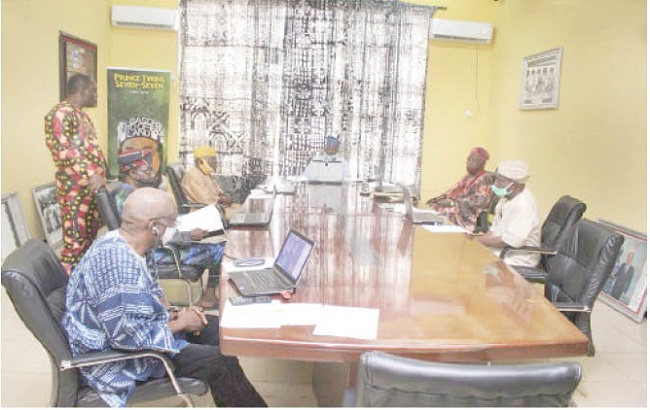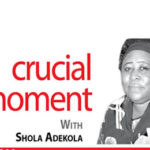ON July 25, cultural enthusiasts, academics, traditional rulers, lovers of traditional institution, among others, gathered at the Centre for Black Culture and International Understanding (CBCIU), Abeere, Osun State, for a national colloquium on the late Timi of Ede, Oba Adetoyese Laoye.
Apart from the few people who were at the CBCIU for the event due to the COVID-19 restrictions, hundred of others participated online from across the world.
In his opening address on the occasion, the current Timi of Ede, Oba (Dr) Munirudeen Adesola Lawal, Laminisa 1, described Oba Laoye, who reigned for 29 years from 1946-1975, as a renowned Nigerian nationalist who projected the African culture in the global space between the 1950s and 1970s.
Oba Lawal revealed that Oba Laoye was the author of the signature tune for the old Western Nigeria Broadcasting Cooporation (WNBC)/Western Nigeria Television (WNTV), “This is Nigeria Broadcasting Service,” which has been variously interpreted as “B’Olubadan ba’ku, ta ni o joye,” “Ninu ikoko dudu lati n se’be,” “Gomina akoko o n’imu oru,” Kosi onigbes’eni bi, lo siile keji,” “Ojegede dudu, inu ta bon,” “Belo Gbadamosi Olori Ole,” Ekoje’badan l’owo, 13 pounds,” and the late Alhaji Maitama Sule thus described him as “the King who made music.”
It should also be noted that Oba Laoye was the first Western-educated Timi of Ede and the first and only Christian monarch that Ede has produced since its founding in the 16th century.
“Timi Laoye made Ede the cultural hub of the Yoruba nation. During his reign, Yoruba obas regularly held conferences on culture in Ede.
“In 1954 and with the support of German scholar, Ulli Beier, the conference of Culture was held in the historic city of Ede. The conference attracted the participation of Ooni Adesoji Aderemi, who presented a paper on the Iwofa system, and Oba Adegboye Adegoriola, the Ogoga of Ikerre, who presented a paper on traditional palace administration in Ekiti. Other participants included Adegboye Babalola, D.O. Fagunwa, Ataoja Samuel Adenle of Osogbo and Oba Moses Oyinlola Olokuku, among others.
“There is no denying the fact that Timi Laoye was ahead of his generation; his contribution to Yoruba culture, traditional institution and community development were enormous,” Oba Lawal said.
In his own address, a former governor of Osun State and chairman of CBCIU, Prince Olagunsoye Oyinlola, spoke on ‘Between Timi Laoye, Ulli Beier and African Culture’.
Prince Oyinlola said “Oba Laoye consistently supported individual and group ambitions on matters related to the culture and arts of Yoruba land, especially in drum, music, festival, and entertainment.
“The relationship between Oba Adetoyese Laoye and German culture expert, Ulli Beier, is a vivid example. As the regional tutor for the extramural studies programme of the University College, Oba Laoye welcomed Beier into Ede community.
“Between 1951 and 1954, which marked the period of the inter-personal life-long relationship, Oba Laoye showed Ulli Beier the true beauty and power of African culture and arts. It is on record that Timi Laoye had very close interactions with Ulli Beier, a relationship which was mutually beneficial.
“In Ede, Beier had important cultural, religious and arts encounters and lessons which directly influenced his scholarship. Ulli learnt that the palace protocol of kneeling or crouching to speak before an Oba did not translate into abject weakness on the part of his subjects and likewise his encounter with babalawos and the olorisas taught him the attributes of modesty and absence of pretentions.
“Beier’s lessons were most profound with Oba Laoye himself, and the Timi became his mentor.
“Beier’s knowledge of Yoruba history, cultural practices and social institutions all form a seamless whole and his more valuable cultural tangibles and intangibles were under the influence of his mentor, Oba Laoye.”
In his welcome remarks, the executive director of CBCIU, Professor Siyan Oyeweso, said Timi Laoye belonged to the tiny club of those Nigerian kings who historians refer to as “Intellectual Monarchs” or “Philosopher Kings.”
Professor Oyeweso said, “This class of monarchs had acquired western education in the opening years of the 20th century and also distinguished themselves as authors and historians in their respective domains.
“Given the corpus of his publications and academic engagements, there is certainly no doubt that Timi Adetoyese Laoye was an intellectual monarch. His published works have remained indispensable roadmap for scholars of African Studies and the bedrock of many masters’ dissertations and Ph.D. theses.”
Professor Toyin Falola of the University of Texas at Austin was the moderator at the event, while Chief Muraina Oyelami, the Eesa of Iragbiji in Osun State, presented a paper, “My Years of Training and Service in the Palace of Timi Laoye and DuroLadipo/MbariMbayo.”
Professor Jelili Ojuade presented the paper entitled, “Timi Laoye and the Popularisation of Yoruba Talking Drum,” while Professor Ahmed Yerima presented the paper entitled, “Timi Laoye through the lens of a Contemporary Artiste,” among other scholarly works.






